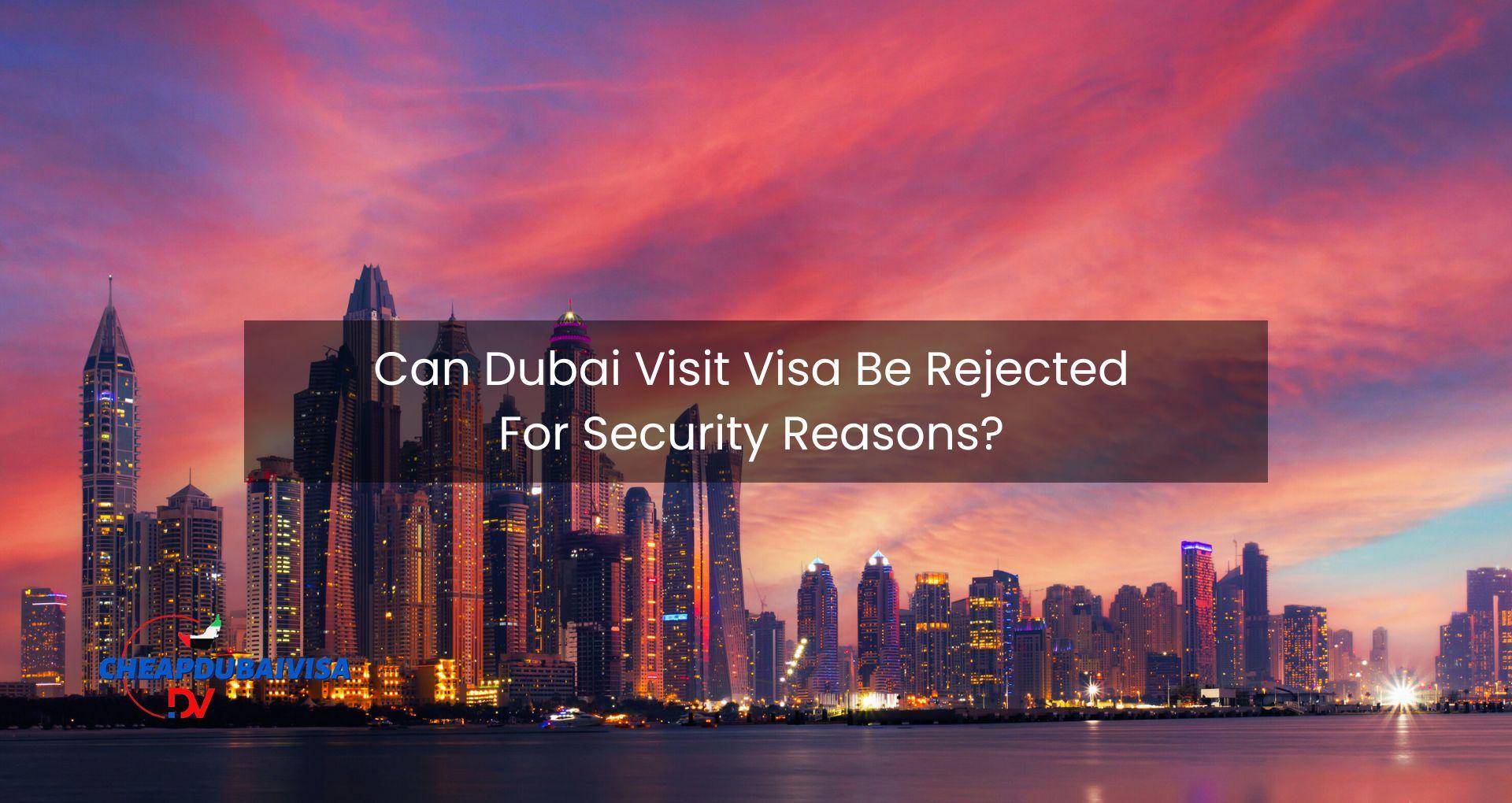Travel Tips
25 Mar, 2025
Can Dubai Visit Visa Be Rejected For Security Reasons?

Dubai’s visa policy is stringent. While many people go to Dubai, their visas are often rejected for other reasons. Security-related issues are one of the many factors that can cause a visa to be rejected. This may sometimes happen when your previous record isn't clear, or your required documents aren't complete.
So what to do?
In this blog, we discuss if your Dubai visit visa can be rejected for security reasons and what options do you have if it gets rejected.
Can Dubai Visit Visa Be Rejected For Security Reasons?
Yes, a Dubai visit visa can be rejected for security reasons. If an applicant has a criminal record or is involved in illegal activities, their visa can be denied. The UAE has strict security measures in place to protect the country.
Likewise, any links to terrorism or organizations threatening national security will lead to rejection. Providing false information on the visa application can also result in denial for security reasons. UAE works closely with international agencies like Interpol to ensure that no one with security concerns enters the country.
They conduct thorough background checks, and any red flags can cause the visa to be rejected. This is why applicants must be honest and ensure they have no security-related issues before applying for a Dubai visit visa.
Security-Related Grounds for Visa Rejection
The UAE has rigorous security policies to ensure the safety of its citizens and visitors. These policies play a significant role in visa approvals. If an applicant has **any history of criminal activity **or legal issues, their visa application could be rejected. Additionally, being involved in suspicious or illegal activities may lead to denial. The UAE also takes links to terrorist organizations or threats to national security very seriously, which can immediately result in visa rejection.
Moreover, providing false or misleading information on a visa application is another common reason for rejection. The UAE collaborates with international organizations like Interpol to check for individuals on global watchlists. If someone is flagged, their visa may be rejected due to these security concerns. It’s important to be truthful and aware of these risks before applying for a Dubai visit visa.
Background Checks and Immigration Screening
The UAE has a detailed screening process for all visa applicants to ensure safety and security. This process involves thorough background checks that examine an applicant’s past, including their legal history and activities. The UAE also works closely with global security agencies to gather information, ensuring no one with potential security threats enters the country.
These background checks are designed to uncover any issues that may not be visible on the surface, such as involvement in illegal activities or connections to dangerous groups. For this reason, applicants must provide accurate and complete information when applying for a visa. Any false or missing details could lead to rejection due to security concerns.
Understanding Dubai Visit Visa Requirements
To get a Dubai visit visa, you must meet a few basic requirements. You must have a valid passport, provide recent photographs, and show proof of your travel plans. In addition, depending on the visa type, you might need to show financial statements or an invitation from someone in Dubai.
Different visas are available depending on how long you plan to stay. There are short-term and long-term visas and tourist and business visas. However, sometimes visas can be rejected. Common reasons for rejections include incomplete documents or past violations of UAE laws. Another reason might be if you have overstayed on a previous visa.
Additionally, providing incorrect information on your application could lead to rejection. This is why ensuring all details are accurate before applying is vital.
Can a Security-Based Visa Rejection Be Appealed?
Yes, a security-based visa rejection can be appealed in the UAE. If your visa application is denied for security reasons, you can request a review of the decision. The first step is to understand the specific reason for the rejection, as this will help you address any issues in your appeal. Moreover, it can be beneficial to seek legal advice or assistance from the UAE embassy or a qualified immigration lawyer. They can guide you on how to present your case effectively. While the appeal process may take time, providing transparent and honest information increases your chances of a successful outcome.
How to Minimize Chances of Visa Rejection?
- Provide Accurate Information. Also, ensure all details are correct.
- Double-check your documents. You must review for errors before submission.
- Complete the required documents, including passport, photos, and travel proof..
- Limit Suspicious Associations: Avoid links to illegal activities.
- You can consult professional visa service agencies. Seeking advice from immigration experts can save a lot of time.
Read More: Dubai Visas For Germany
Conclusion
To ensure your Dubai visa isn't rejected, you must complete all your documents. Moreover, your previous record should also be clear, and you must not have any violation records. Remember that UAE’s success is massively due to its immigration policy which allows no room for errors. So be cautious and seek professional help for your visa application whenever you feel stuck.
How can I find out why my visit visa was rejected?
Contact the UAE embassy or consulate where you applied to find out the reason for your visit visa rejection. They can provide specific details regarding the denial.
Can I reapply for a UAE visa if my application is rejected?
You can reapply for a UAE visa even if your previous application was rejected. However, it is important to address the issues that led to rejection before submitting a new application.